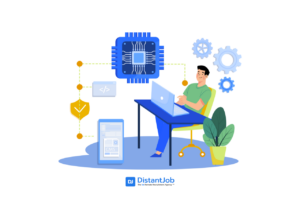What do you think of, when you think of a remote worker? If it’s one of those Instagrammable shots of a laptop against the backdrop of a rainforest canopy or deserted beach then we’re going to need you to think again. The remote worker and digital nomad distinction is one that needs to be made; they’re very different things.

Back in the early 1990s, the definition of the worker was simple. It was someone who got up each morning, got dressed in professional attire, and made their way to an office where they sat, with their colleagues, and go on with their jobs. But, as the WWW spread and connectivity became more available, the ability to work from home became a tantalizing possibility.
If you had dial-up, or better still an ISDN line at home, then you could connect to your office and log in to the network there, and still work on files that were stored locally. But working from home back then was something that was really only done when circumstances demanded it.
As time went by, so connectivity improved. First, we could reliably talk via VOIP, and then came video calls that didn’t just pixellate people. Developers created a whole raft of tools to help people stay in touch and collaborate while they worked from their home or an office in a different location.
Which brings us to today. The internet is accessible pretty much anywhere and 5G is improving communication all the time. So yes, it’s possible to do a lot more jobs from anywhere than it ever has been before. But does that really mean all remote workers are sipping cocktails poolside in Bali? Of course not.
The Average Remote Worker

Ever since people started working from home, we’ve been trying to spread the word about the true remote work definition. It used to be the myth of someone working in their PJ’s putting in enough hours between episodes of Judge Judy to get by, and now it’s evolved to the digital nomad.
But the truth is that, according to Global Workplace Analytics, the average remote worker is usually a college-educated 45-year-old working for a company with more than 100 staff. We would define that remote workers are just workers who don’t come into an office, there’s no other difference than that.
Think about it this way; the vast majority of jobs require you to work ‘office hours’ so that you can connect with colleagues. When we find remote rockstars to join our client’s technical team, we recommend that the remote worker shares office hours with the home office no matter where in the world they live. Many of our clients compromise on that and only ask for a couple of hours overlap with head office time. That’s a commitment that isn’t compatible with a lot of traveling.
Digital Nomadism
Prior to the release of The 4-Hour Workweek by Timothy Ferriss in 2007, the term digital nomad hadn’t really been heard. But that books promise, that you could travel anywhere in the world, and fund your dream lifestyle in just a few hours a week really caught on and soon became the accepted digital nomad definition.
And yes, there are people who work like that, but they’re a definite minority. They work in roles where location really doesn’t matter, where they don’t need to work set office hours or be a part of a team. They’re probably still working more than 4 hours a week, but if they can make that extreme of a work/life balance work for them, then we salute them!
As our podcast guest, Mickael Romaniello explained, it isn’t always easy to balance a more nomadic lifestyle and work commitments. It is possible, and if you want to support your staff in doing that, then that’s great but it isn’t what the vast majority of people consider to be the meaning of remote work.
Digital Nomad vs Remote Worker
Surely this is all semantics, though. It doesn’t matter if we mean digital nomad when we say remote worker, does it? Well, yes, it does. As we said, we’ve been trying to deconstruct the stereotypes and battle the resistance to remote work for years, because it doesn’t seem to matter how many times we talk about the advantages of hiring remotely, the harmful idea that remote workers don’t actually work persists.
But you should know that the main difference between a remote worker vs a digital nomad is that a remote worker is a full-time employee. These are talented, dedicated, highly driven people who are able to bring real benefits to your business. But if there’s a fear that hiring remote is a synonym for supporting someone’s digital nomad lifestyle there may be an unnecessary reluctance to take the step that could help you find some incredible development talent.
How To Find A Reliable Remote Worker
When you start your search for a global superstar, you need to be clear about what the terms of employment are going to be. What hours do you need your team to keep, when and how to they check-in, and what sort of flexibility are you allowing them. We’d advocate for focusing on what they deliver rather than simple presenteeism via the time they spend at the keyboard but if you want to put limits on where and when that person works, that’s just fine and most remote workers will expect that.
But if you’re not sure about venturing into hiring remote talent without some help, then never fear. That’s just what we do at DistantJob! We help companies find the very best remote talent no matter where it is in the world, and we make sure they’re a cultural match, too, so if you are a nomad free zone we will screen for that first. Sound interesting? Get in touch today to find out how we can help.




